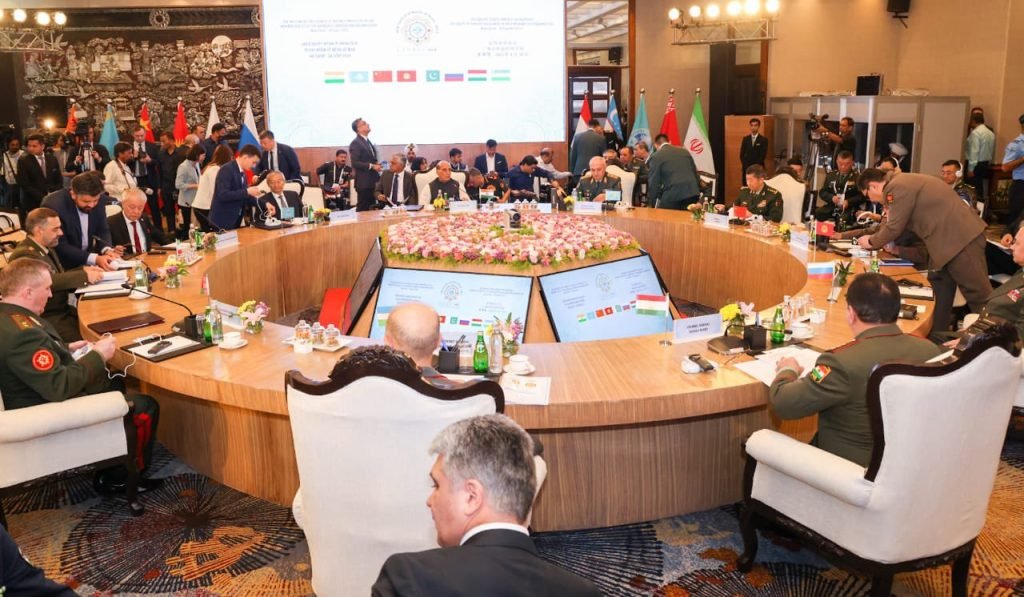New Delhi, 29 April 2023 (TDI): As chair of the Shanghai Cooperation Organization (SCO), India convened a meeting of the SCO’s military ministers. The subject for the SCO in 2023 is ‘SECURE-SCO,’ which underlined the importance of promoting regional multilateral, political, security, economic, and people-to-people interactions.
Members of Kazakhstan, China, Kyrgyzstan, Russia, Tajikistan, Uzbekistan, Belarus, and Iran were present at the summit. Pakistan participated virtually in the meeting of the SCO defense ministers in Delhi.
The SCO called the summit to examine several issues, including counterterrorism initiatives, regional peace and security, and the promotion of effective multilateralism.
#India is currently hosting Defence Ministers from the Shanghai Cooperation Organisation (#SCO). #Russia'n Defence Minister Sergei Shoigu taking part. pic.twitter.com/OH6sdK2hQZ
— Russia in India 🇷🇺 (@RusEmbIndia) April 28, 2023
The seminar was presided over by India’s Defense Minister, Rajnath Singh. He stressed that young radicalization is a serious issue, both from a security and a socioeconomic perspective. It is a significant barrier to societal advancement.
Singh made aggressive remarks on terrorism. He urged SCO members to cooperate in the fight against it. Moreover, he said, countries that provide a haven to terrorists endanger themselves and the international community.
Addressed the SCO Defence Ministers’ meeting in New Delhi.
— Rajnath Singh (@rajnathsingh) April 28, 2023
India believes in maintaining peace & security based on UN Charter provisions.
Exhorted for concerted efforts to ensure win-win cooperation for great gain. https://t.co/6PSMTmzIfy pic.twitter.com/VA9AIW7TMe
Pakistan, a proud member of the SCO, reaffirmed its unwavering commitment to regional peace and prosperity. Malik Ahmed Khan, Pakistan’s Special Assistant to the Prime Minister on Defense Affairs, represented Defense Minister Khawaja Muhammad Asif virtually at the SCO Defense Ministers’ Conference.
Malik Ahmed Khan SAPM on Defence Affairs attended SCO Defence Minister’s Conference on behalf of Defence Minister Khawaja Muhammad Asif. Participation reflects Pakistan's continued commitment towards SCO charter and Pakistan's resolve to strengthen regional cooperation. pic.twitter.com/Vr8ptbneL9
— Ministry of Foreign Affairs - Pakistan (@ForeignOfficePk) April 28, 2023
According to the Spokesperson Khan, Pakistan’s position on terrorism has always been unambiguous. He cited that Pakistan, as a nation at the forefront of the battle against terrorism, has proved its determination to eradicate terrorism in all its forms and manifestations. The country has made significant sacrifices in this area, including the lives of its brave warriors and civilians.
Additionally, he noted that the government had taken several steps to combat terrorism, such as implementing a thorough National Action Plan, strengthening border security, and enhancing intelligence sharing.
He emphasized that Pakistan has always believed in constructive dialogue and peaceful coexistence with its neighbors. It has consistently stressed diplomacy and communication’s significance in settling unresolved problems.
Also Read: Chinese Defence Minister meets his Indian Counterpart
In addition, he reiterated that Pakistan adheres to the SCO’s fundamental values, which include acceptance of diverse cultural practices, equality, mutual trust, and mutual advancement.
The country has been critical in promoting regional stability and economic growth. Pakistan values its SCO membership and looks forward to working closely with other member countries to achieve its goals.
Sergei Shoigu, the Defense Minister of Russia, denounced Western efforts to isolate Moscow over the conflict in Ukraine. He claimed that similar efforts are still being made to influence Russia’s allies in this direction.
He stressed the need for increased military cooperation inside the SCO. He also called for joint drills and other forms of combat training.
#Shoigu: The West's countermeasures for developing multilateralism could be evidently observed in the Asia–Pacific region. NATO is willing to establish dominance in Asia-Pacific region. #SCO Defence Ministers Meeting in #NewDelhi ➡ https://t.co/Q7z2bcotyP | #SCO2023 pic.twitter.com/yTTEkK28Ox
— Russia in India 🇷🇺 (@RusEmbIndia) April 28, 2023
Li Shangfu, State Councilor and Minister of National Defense of China, stated that China desires to work with other members of the SCO to develop a balanced, effective, and long-term security architecture.
He underlined that important consensuses were made at the SCO Council of Heads of State meeting in Samarkand, Uzbekistan, last September.
Li noted that China is eager to work with other SCO members to execute the Global Security Initiative, enhance strategic confidence, strengthen anti-terrorism cooperation, expand cooperation fields, and develop cooperation mechanisms to promote global and regional peace and stability.
The defense ministers agreed to increase strategic communication in the future, concentrate on reaching a consensus, broaden SCO collaboration, and work together to maintain regional security and stability.
Group photograph at the Council of Defence Ministers of the Member States of the Shanghai Cooperation Organisation (SCO) meeting in New Delhi. pic.twitter.com/5iAWzAMOZd
— रक्षा मंत्री कार्यालय/ RMO India (@DefenceMinIndia) April 28, 2023
In a joint statement, the member countries reiterated their commitment to the SCO’s core values of mutual trust, mutual benefit, equality, consultation, respect for diverse civilizations, and the pursuit of joint development.
They expressed their commitment to upholding international law and the principles of the UN Charter and SCO Charter. They advocated peaceful conversation to resolve issues.
The member countries also expressed concern over the region’s security situation. They pledged to work together to combat terrorism and extremism. They urged greater collaboration in law enforcement, intelligence sharing, and border security.
In addition, the member countries discussed ways to deepen economic cooperation and enhance connectivity within the region. Central Asian Countries supported the Belt and Road Initiative (BRI) and other regional connectivity projects.
They called for promoting trade and investment, expanding cultural exchanges, and enhancing people-to-people contacts.
Despite regional complexities and friction points, members of the SCO also agreed on issues such as protecting vulnerable populations and cooperating on humanitarian aid and disaster relief.
All SCO member nations signed a protocol after the meeting expressing their commitment to ensuring the region’s safety, stability, and prosperity.
A student of International Relations interested in National Security strategies, with a good focus on Geo-Politics, Foreign Policy, and Public & Cultural Diplomacy.
- This author does not have any more posts.















